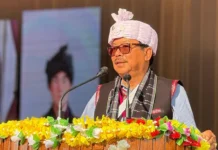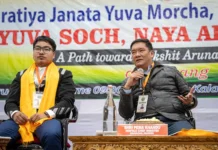ZIRO, 1 Jul: The Right to Information (RTI) Act, 2005 has heralded many positive changes in the state after its implementation, Chief Information Commissioner (CIC) Rinchin Dorjee said.
Addressing an awareness programme on the RTI Act at Abotani Hall here in Lower Subansiri district on Saturday, the CIC said that the Act is a citizen-friendly mechanism devised by government in the interest of the citizens.
“Government officials are public servants whose duty is to serve the public. Public interest ought to be the topmost priority. They must strive to fulfill the aspirations of the citizens,” he said.
Stating that the Act has been devised in the larger interest of the citizens, the CIC appealed to the participants to use it (the Act) rationally and judiciously for the welfare of the state, rather than for personal gains.
State Information Commissioner (SIC) Sonam Yudron dwelt on
Chapter 2, Section 3 to 7 of the Act and explained the process of filing application; the roles of public information officers and assistant public information officers; suo moto disclosures of information; and categories of information exempted from furnishing to the appellant.
Yudron also explained the process and time period of approaching an officer higher than the PIO or the SIC in case of refusal by a PIO to furnish the information or willful delay in furnishing of the same.
Explaining Chapter 2, Section 8 to 10 of the Act, SIC Gumjum Haider said that the Act has been devised and envisioned to help the citizens and to root out corruption from the system. He also explained the categories of information to be revealed and exempted from revealing; the grounds for rejection of certain information sought; disclosure of information provided to the CPIO or the PIO by a third party, and its timeframe.
SIC Genom Tekseng explained Chapter 5, Section 18 of the Act, dealing with the powers, functions, appeals and penalties available with the SIC.
Earlier, APIC Registrar Taro Mize informed that similar awareness training programmes were organised in Namsai and other districts also.
The registrar said that “many officers are not well-acquainted with the rules and manuals of the RTI Act,” and urged them to “update themselves.”
The APIC registrar further said that “the RTI Act is basically meant to facilitate providing information to citizens for good governance and to lead people in the right direction.”
Underscoring the importance of the Act in facilitating accountability, transparency and efficient administration, Lower Subansiri Deputy Commissioner Bamin Nime advocated “striking a healthy balance between the PIOs and RTI activists.”
“So many RTI activists are mushrooming in the state. Genuine information seekers need to be chaffed out from the fake and malafide information seekers; else there would be chaos,” he said, and pleaded with the commission to “come up with a mechanism to curb the souring menace.”
More than 100 participants, including PIOs, APIOs and officials of Lower Subansiri, Kamle, Kra Daadi and Kurung Kumey districts, and a few RTI activists attended the training programme.
An intense ‘open-house discussion’ involving the participants and the APIC team was also held, during which all doubts pertaining to the RTI Act were cleared.
The programme was organised by the Lower Subansiri district administration. (DIPRO)





